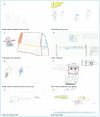EMOTIONAL REPERCUSSIONS AND QUALITY OF LIFE IN CHILDREN AND ADOLESCENTS UNDERGOING HEMODIALYSIS OR AFTER KIDNEY TRANSPLANTATION
- PMID: 31778416
- PMCID: PMC6909242
- DOI: 10.1590/1984-0462/2020/38/2018221
EMOTIONAL REPERCUSSIONS AND QUALITY OF LIFE IN CHILDREN AND ADOLESCENTS UNDERGOING HEMODIALYSIS OR AFTER KIDNEY TRANSPLANTATION
Abstract
Objective: To investigate the emotional repercussions and quality of life (QOL) associated with end-stage kidney disease (ESKD) in children and adolescents undergoing hemodialysis or a kidney transplant (TX).
Methods: We conducted a quantitative-qualitative study. 48 children and adolescents with ESKD were interviewed; half of them underwent hemodialysis treatment, and the other half had a kidney transplantation. Their respective 48 caregivers also participated in the study. The questionnaire involved both the Pediatric Quality of Life Inventory and a thematic story-drawing tool. An analysis of the QOL questionnaire's results was done by comparing the sum of points between groups and the theme-based story-drawing consisted of interpreting the data contained in the material using Freudian and Lacanian theories.
Results: In the QOL questionnaires, the total score was higher in the transplanted patients and in their caregivers, suggesting a perception of better QOL after kidney transplantation. In the specific aspects of the questionnaire, physical capacity was considered superior by children who underwent transplants and their caregivers. There were no differences between the groups in the emotional, social and school aspects. However, the caregivers of the patients who had a transplant perceived a significant difference in QOL in the school aspect. In the thematic story-drawings, emotional suffering in the two analyzed groups was evidenced regardless of the treatment.
Conclusions: Despite the questionnaire results suggesting that transplantation does improve some aspects of QOL, there were no differences observed between kidney replacement therapies regarding the emotional repercussion of chronic kidney disease.
Objetivo:: Investigar as repercussões emocionais e a qualidade de vida (QV) associadas à doença renal crônica em crianças e adolescentes submetidos à hemodiálise ou ao transplante renal.
Métodos:: Foram entrevistadas 48 crianças e adolescentes com doença renal crônica, metade dos quais submetidos ao tratamento hemodialítico, e a outra metade, ao transplante renal. Os 48 respectivos cuidadores também participaram da pesquisa. Utilizou-se o questionário de QV Pediatric Quality of Life Inventory e o instrumento de desenho-estória com tema. A análise dos resultados do questionário de QV foi feita pela somatória dos pontos e a dos desenhos-estórias com tema consistiu na interpretação dos dados do material, utilizando as teorias freudiana e lacaniana.
Resultados:: Nos questionários de QV, a pontuação total foi superior na opinião dos pacientes transplantados e seus cuidadores, indicando percepção de melhor QV após o transplante renal. Nos aspectos específicos, a capacidade física também foi considerada superior por esse grupo. Não houve diferenças entre os grupos de pacientes nos aspectos emocional, social e escolar, porém os cuidadores dos pacientes transplantados notaram diferença na QV no aspecto escolar. Nos desenhos-estórias com tema, observou-se que o sofrimento emocional foi evidenciado nos dois grupos estudados.
Conclusões:: Não foram percebidas diferenças entre as terapêuticas renais substitutivas quanto às repercussões emocionais da doença renal crônica. Por outro lado, verificou-se que o transplante melhora a QV no aspecto geral.
Conflict of interest statement
The authors declare no conflict of interests.
Figures
References
-
- Maragno F, Zanini MT, Rosa R, Ceretta LB, Medeiros IS, Soratto MT. The hemodialysis of everyday life in chronic kidney patients. Rev Inova Saude. 2012;1:16–30.
-
- Soldá DA, Carvalho J, Fortes VL, Pomatti DM, Matte MM. Return to hemodialisis after the failure of renal transplantation: patient manifestations. Nursing (São Paulo) 2010;12:39–45.
-
- Al-Aribi S. Quality of life: subjective descriptions of challenges to patients with end stage renal disease. Nephrol Nurs J. 2006;33:285–292. - PubMed
Publication types
MeSH terms
LinkOut - more resources
Full Text Sources
Medical


